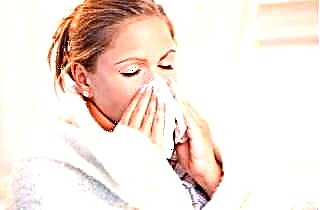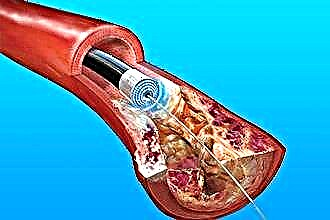You can catch a respiratory illness at any time. Unfortunately, neither pregnant women nor breastfeeding mothers are immune from this trouble. The first symptom is a sore throat and cough, and then other signs of SARS begin to appear. Although there are non-infectious causes of cough, they all together account for just over 20% of cases. Therefore, when choosing how to treat a cough while breastfeeding, mothers usually prefer folk remedies. This choice is logical, but not always justified.
No self-medication!
 During the period of breastfeeding, the mother is no less responsible for the health and life of the baby than during pregnancy. But if, being in the womb, the baby could practically not be afraid of a massive attack of pathogenic microorganisms, then the baby is practically defenseless in front of them. His immune system is still far from perfect, and all organs are so close to each other that the inflammatory process easily passes from one to the other. Therefore, even a harmless cold, if untreated, can cause serious complications.
During the period of breastfeeding, the mother is no less responsible for the health and life of the baby than during pregnancy. But if, being in the womb, the baby could practically not be afraid of a massive attack of pathogenic microorganisms, then the baby is practically defenseless in front of them. His immune system is still far from perfect, and all organs are so close to each other that the inflammatory process easily passes from one to the other. Therefore, even a harmless cold, if untreated, can cause serious complications.
If a nursing mother's cough is caused by a serious infection, then no folk remedies will help. Moreover, this method of treatment will only lead to wasted time, during which the disease will actively develop, and the risk of infecting the baby will increase every day.
Therefore, it is necessary to immediately call a doctor and limit contact with the child as much as possible when the following symptoms appear:
- a sharp jump in body temperature up to 39OC and higher;
- severe pain and redness of the throat;
- complete lack of appetite, difficulty swallowing;
- frequent paroxysmal barking cough;
- pus and / or traces (clots) of blood in the expectorated sputum;
- strong wheezing, which is clearly audible when breathing;
- sharp pain in the chest when coughing or taking a deep breath.
Such symptoms may indicate purulent sore throat, infectious bronchitis, pneumonia, tuberculosis, which cannot be cured with folk remedies. Their use instead of effective complex treatment with antibiotics or antiviral drugs jeopardizes the health and life of the mother and child!
Folk remedies
But if the mother's condition is satisfactory and the cough is caused by a cold, flu or SARS, then home treatment should be started immediately. And in this case, folk methods will come in handy: they are safe for the baby and quite effective when used correctly for the mother.
Ways that are absolutely safe for a child than to treat a cough for a nursing mother are:
 Gargling. For rinsing, it is better to take a solution of sea salt, furacillin or an oily solution of chlorophyllipt. It is advisable to gargle the throat in the morning, upon waking up, and after each meal, before additional drug treatment.
Gargling. For rinsing, it is better to take a solution of sea salt, furacillin or an oily solution of chlorophyllipt. It is advisable to gargle the throat in the morning, upon waking up, and after each meal, before additional drug treatment.- Steam inhalation. With mineral water "Borjomi", soda solution or decoctions of medicinal herbs. They quickly soften coughs, moisturize mucous membranes, and contribute to their active recovery. Duration of inhalation is 7-10 minutes, they can be carried out up to 2 times a day.
- Green tea with milk. Ideal cough suppressant for breastfeeding: boosts immunity, softens coughs, invigorates and increases milk secretion. You can add a little sugar or honey for flavor.
- Warm milk. Even without any additives, it soothes a sore throat well and creates a protective film on it. However, fig, banana, or onion milk is even healthier. In a glass of milk, boil 3-4 figs (a large banana or 2 large onions) for 5 minutes. Remove the onions and discard, and the figs or bananas, if desired, can be chopped with a blender to make a smoothie. Drink warm 1-2 times a day. Warm milk with cocoa butter, bear or goat fat helps well with coughs.
- Herbal tea. You need to be careful with herbs - many of them can cause severe allergies in the baby. Safe for a child are: linden, rose hips, currant leaves, raspberries. You can add a little honey to your tea. Drink in small sips, pleasantly warm, up to 1.5 liters per day.
- Mustard plasters. This effective and simple cough treatment was banned throughout pregnancy. Now is the time to remember and apply it. Moreover, you can use not only pharmacy mustard plasters, but also a homemade mixture of mustard and honey, applied to parchment, which is much more effective and does not burn the skin so much.
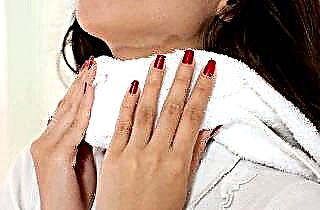 Compresses. They help well with tonsillitis (around the neck), bronchitis, tracheitis, pneumonia. They are not very effective for the common cold. You can use honey cakes, a cabbage leaf smeared with honey, mashed potatoes with red pepper (almost a mustard plaster!), Or vodka compresses. The procedure is performed at night every other day at a body temperature below 37.2OWITH.
Compresses. They help well with tonsillitis (around the neck), bronchitis, tracheitis, pneumonia. They are not very effective for the common cold. You can use honey cakes, a cabbage leaf smeared with honey, mashed potatoes with red pepper (almost a mustard plaster!), Or vodka compresses. The procedure is performed at night every other day at a body temperature below 37.2OWITH.
With the use of some popular cough remedies, a nursing mother needs to be very careful. Onions, garlic, lemon, essential oils, some plants and even honey can provoke allergies in a child. And onions and garlic (fresh) also impair the taste of milk, and the baby may simply refuse to breast.
Pharmacy preparations
Some modern cough medicines are also completely natural and completely safe for the baby and the nursing mother. But their effectiveness is sometimes several times higher than traditional methods, since the concentration of plant extracts and their proportions are kept optimally. The main thing is to consult a doctor or pharmacist before buying and using them and carefully study the instructions.
In order to get the most accurate information about what can be taken from a cough during feeding, it is advisable to describe the problem as fully as possible: the type of cough, its frequency, nature, and accompanying symptoms.
Various drugs are used to treat different types of cough, and it is difficult to independently navigate in their variety.
Here are some of the most effective feeding methods:
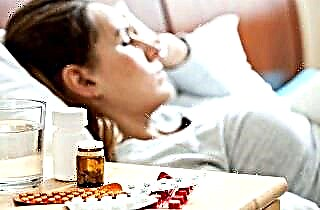 Stodal. Complete homeopathic remedy, completely natural. Helps to quickly get rid of any type of cough. Produced in a convenient syrup form, it has a pleasant taste.
Stodal. Complete homeopathic remedy, completely natural. Helps to quickly get rid of any type of cough. Produced in a convenient syrup form, it has a pleasant taste.- Ambroxol. An excellent expectorant drug that is used to treat wet coughs. It dilutes phlegm well, promotes its active discharge.
- Plantain syrup. An expectorant with a pronounced anti-inflammatory effect, quickly relieves coughing and sore throat.
- "Alteika". Sweet syrup based on marshmallow root, which has mucolytic and expectorant effects.
- "Liquorice root". It quickly converts an unproductive cough into a productive cough, dilutes phlegm, and is an antiviral agent. Perfect for the treatment of ARVI.
A good therapeutic effect is provided by the use of topical preparations, which include tablets, lozenges and cough lozenges. Some of them are also completely natural, for example "Doctor Theiss" or "Doctor IOM".
Others contain antibiotics that quickly kill pathogenic microorganisms in the oral cavity: Septefril, Septolette, Faringosept, Grammicidin. But even an antibiotic in this form is safe for the baby - remaining on the mucous membranes, it practically does not enter the bloodstream, and even more so into the mother's milk.
The use of most other drugs: antiviral, antipyretic, antifungal, antihistamines are also mostly safe for the child.But you should not use them without a doctor's prescription. Only at high temperatures can you take "Paracetamol" or "Panadol" on your own. But if it does not fall within a day, then a specialist consultation is necessary.
Feeding features
The most common mistake of nursing mothers is immediate weaning of the baby from the breast in case of a viral disease. If you were going to do it anyway due to age or other reasons, then such a decision is justified. But in all other cases it is illogical and is taken solely out of ignorance of the processes taking place in the mother's body.
 When an infection enters the body of a nursing woman, it begins to actively produce protective antibodies. They are found in the mother's blood and partially pass into the milk. When fed, antibodies are transferred to the baby's body, thus strengthening its natural defenses and "training" the immune system. By weaning your baby from the breast, you do not give him the opportunity to further strengthen the immune system.
When an infection enters the body of a nursing woman, it begins to actively produce protective antibodies. They are found in the mother's blood and partially pass into the milk. When fed, antibodies are transferred to the baby's body, thus strengthening its natural defenses and "training" the immune system. By weaning your baby from the breast, you do not give him the opportunity to further strengthen the immune system.
If the baby is still very young and the mother has enough milk to support breastfeeding, the milk must be stored. Therefore, if potent drugs that can harm the baby are not used, feeding continues.
But the mother's face at this time should be covered with a gauze bandage to prevent direct transmission of infection by airborne droplets.
Another no less common mistake is boiling expressed milk, after which it no longer differs from the usual mixture or cow milk - all antibodies die at high temperatures. But some microbes can survive the boiling process. Therefore, if the mother has a serious infection and / or she is taking antibiotics, then the expressed will have to be poured out, and the child will be temporarily transferred to adapted mixtures.
There are situations when a mother and a child are simultaneously ill with the same infectious disease. And then, taking an antibiotic and continuing to breastfeed, the mother actually provides the child with the form of the drug that is most adapted for him. Of course, this can only be done under the supervision of the attending physician. But in most cases, continued feeding relieves the baby from injections and medication.
Cough prevention
It is always better not to get sick than to be treated. And such troubles as acute respiratory infections and colds for a nursing mother can be avoided if certain precautions are taken:
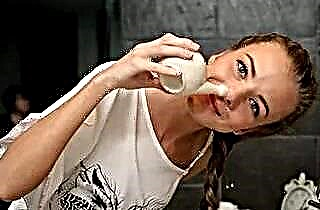 wash your hands thoroughly with soap and water and rinse your nose with water after the street;
wash your hands thoroughly with soap and water and rinse your nose with water after the street;- do not use public dishes, other people's towels, etc.;
- avoid crowded places during periods of respiratory disease outbreaks;
- review and build the daily routine so that there is enough time for sleep;
- avoid excessive physical exertion, stress, severe overwork;
- take vitamin supplements designed for nursing mothers;
- walk in the fresh air for at least an hour a day;
- ventilate the apartment daily, do wet cleaning at least 2 times a week.
But the main thing is not to contact people who are already sick, even if they are family members. If there is no possibility of isolating patients, an ordinary gauze bandage will help protect against infection, which must be changed twice a day.
Remember that, just like during pregnancy, the health of the baby depends on your health until the end of the breastfeeding period!

 Gargling. For rinsing, it is better to take a solution of sea salt, furacillin or an oily solution of chlorophyllipt. It is advisable to gargle the throat in the morning, upon waking up, and after each meal, before additional drug treatment.
Gargling. For rinsing, it is better to take a solution of sea salt, furacillin or an oily solution of chlorophyllipt. It is advisable to gargle the throat in the morning, upon waking up, and after each meal, before additional drug treatment. Compresses. They help well with tonsillitis (around the neck), bronchitis, tracheitis, pneumonia. They are not very effective for the common cold. You can use honey cakes, a cabbage leaf smeared with honey, mashed potatoes with red pepper (almost a mustard plaster!), Or vodka compresses. The procedure is performed at night every other day at a body temperature below 37.2OWITH.
Compresses. They help well with tonsillitis (around the neck), bronchitis, tracheitis, pneumonia. They are not very effective for the common cold. You can use honey cakes, a cabbage leaf smeared with honey, mashed potatoes with red pepper (almost a mustard plaster!), Or vodka compresses. The procedure is performed at night every other day at a body temperature below 37.2OWITH. Stodal. Complete homeopathic remedy, completely natural. Helps to quickly get rid of any type of cough. Produced in a convenient syrup form, it has a pleasant taste.
Stodal. Complete homeopathic remedy, completely natural. Helps to quickly get rid of any type of cough. Produced in a convenient syrup form, it has a pleasant taste. wash your hands thoroughly with soap and water and rinse your nose with water after the street;
wash your hands thoroughly with soap and water and rinse your nose with water after the street;
